14语态转换译法
- 格式:ppt
- 大小:710.00 KB
- 文档页数:51
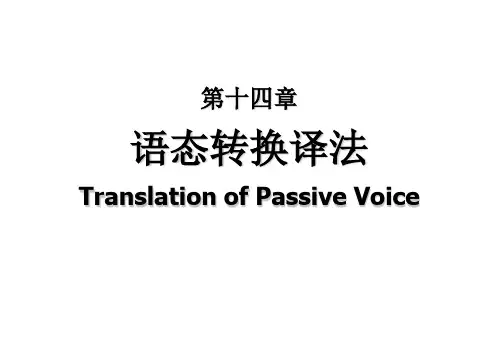
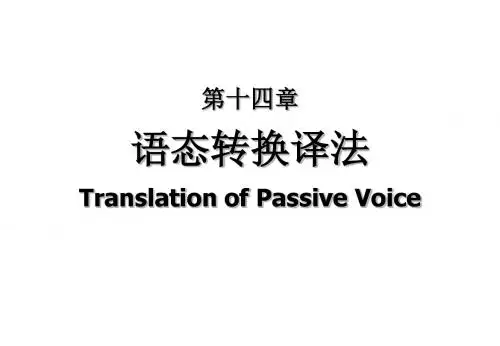
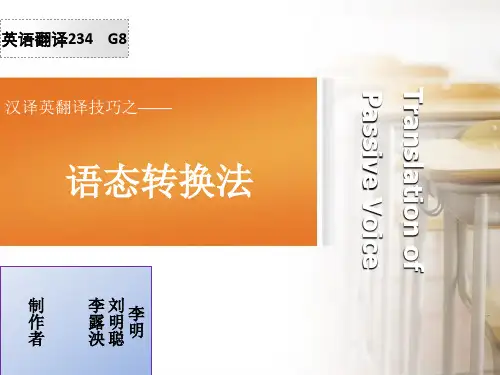
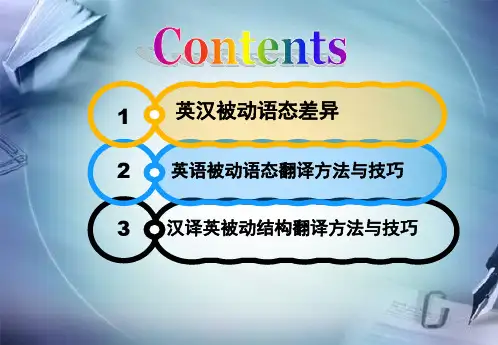
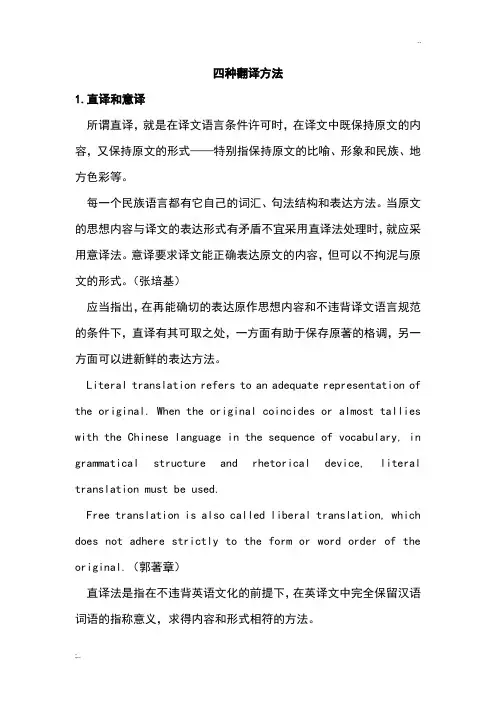
四种翻译方法1.直译和意译所谓直译,就是在译文语言条件许可时,在译文中既保持原文的内容,又保持原文的形式——特别指保持原文的比喻、形象和民族、地方色彩等。
每一个民族语言都有它自己的词汇、句法结构和表达方法。
当原文的思想内容与译文的表达形式有矛盾不宜采用直译法处理时,就应采用意译法。
意译要求译文能正确表达原文的内容,但可以不拘泥与原文的形式。
(张培基)应当指出,在再能确切的表达原作思想内容和不违背译文语言规范的条件下,直译有其可取之处,一方面有助于保存原著的格调,另一方面可以进新鲜的表达方法。
Literal translation refers to an adequate representation of the original. When the original coincides or almost tallies with the Chinese language in the sequence of vocabulary, in grammatical structure and rhetorical device, literal translation must be used.Free translation is also called liberal translation, which does not adhere strictly to the form or word order of the original.(郭著章)直译法是指在不违背英语文化的前提下,在英译文中完全保留汉语词语的指称意义,求得内容和形式相符的方法。
意译是指译者在受到译语社会文化差异的局限时,不得不舍弃原文的字面意义,以求疑问与原文的内容相符和主要语言功能的相似。
(陈宏薇)简单地说,直译指在译文中采用原作的的表达方法,句子结构与原句相似,但也不排除在短语层次进行某些调整。
意译指在译文中舍弃原作的表达方法,另觅同意等效的表达方法,或指对原作的句子结构进行较大的变化或调整。

语态转换法Changeofvoices第七讲语态变换法语态转换的常见方法一、英语被动句译成汉语主动句(最常见的方法)(一)原文主语在译文中仍作主语(直接改译)1.The street was congested.街上很挤。
2.That man cannot be relied upon.那人不可信。
3.The oil of the world will have been used up,and man will be using the more convenientpower obtained from the splitting of the atom.全世界的石油将会用尽,人们将使用从原子分裂获得的这种更为方便的动力。
4.The discovery is highly appreciated in the circle of science.这一发现在科学界得到了很高的评价。
(二)原文主语在译文中作宾语1.If bad weather is expected,the forecaster must be able to suggest another airport within therange of the aircraft where the weather will be suitable for landing.如果预计天气恶劣,天气预报人员必须能够在该飞机航程内提出另一个天气适合着陆的机场。
2.A national link-up of computers could mean that a large amount of information will besupplied to anyone who uses the system.把全国的电脑连接起来意味着可以向任何使用该系统的人提供大量信息。
3.The rocket was invented by Chinese in the12th century.中国人于12世纪发明了火箭。
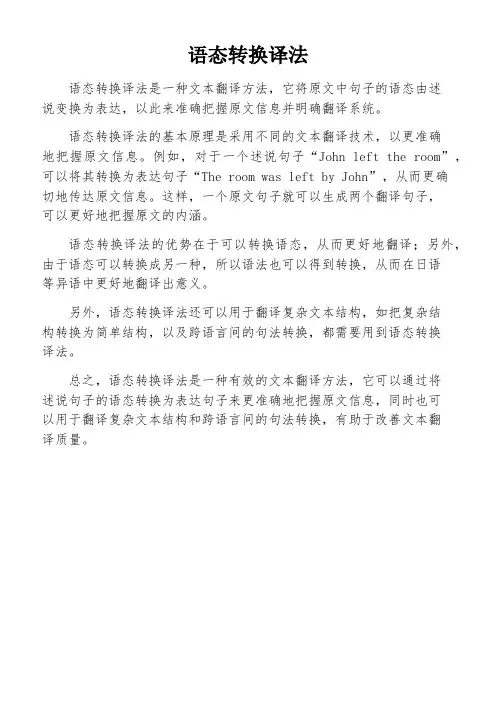
语态转换译法
语态转换译法是一种文本翻译方法,它将原文中句子的语态由述
说变换为表达,以此来准确把握原文信息并明确翻译系统。
语态转换译法的基本原理是采用不同的文本翻译技术,以更准确
地把握原文信息。
例如,对于一个述说句子“John left the room”,可以将其转换为表达句子“The room was left by John”,从而更确
切地传达原文信息。
这样,一个原文句子就可以生成两个翻译句子,
可以更好地把握原文的内涵。
语态转换译法的优势在于可以转换语态,从而更好地翻译;另外,由于语态可以转换成另一种,所以语法也可以得到转换,从而在日语
等异语中更好地翻译出意义。
另外,语态转换译法还可以用于翻译复杂文本结构,如把复杂结
构转换为简单结构,以及跨语言间的句法转换,都需要用到语态转换
译法。
总之,语态转换译法是一种有效的文本翻译方法,它可以通过将
述说句子的语态转换为表达句子来更准确地把握原文信息,同时也可
以用于翻译复杂文本结构和跨语言间的句法转换,有助于改善文本翻
译质量。
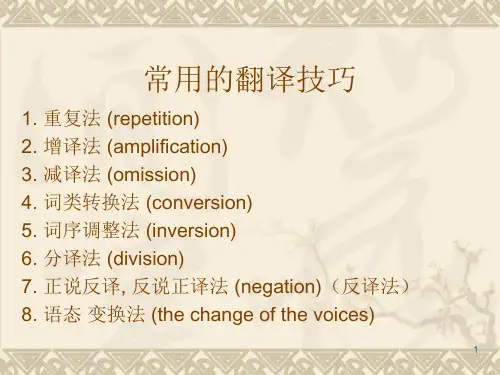


语态转换将主动结构变为被动结构时,先把主动结构的宾语变为被动结构的主语(如为代词,宾格须变为主格),接着把主动结构的动词由主动语态变为被动语态,最后在动词被动语态之后加介词by,再将主动结构中的主语放在by 之后,变为by的宾语(如为代词,主格须变为宾格).英语中大多数有及物动词的主动句都可以转换为被动句,具体转换及注意事项如下: (一).含一个宾语的主动句带一个宾语的主动句变为被动句时,把宾语变为主语,动词由主动结构变为被动结构,主语变为由介词引起的短语,by引起的短语有时可以省略.如:主动句:People play football all over the world.世界各地的人都踢足球.被动句:Football is played all over the world.(世界各地都踢足球)主动句:The workers are building a road.工人们正在修建一条路.被动句:A road is being built.(二).含双宾语的主动句带一个直接宾语和一个间接宾语的主动句变为被动句时,只把其中一个宾语变为主语.如: 主动句:Mother gave me the present. 母亲给我这件礼物.被动句:I was given the present by mother.或 The present was given (to )me by mother.(这件礼物是母亲给我的)主动句:My friend lent me those books. 我的朋友借给我这些书.被动句:I was lent the books by my friend.或:Those books were lent to me by my friend.(这些书是朋友借给我的) (三).含有两个直接宾语的主动句带有两个直接宾语的主动句变为被动句时,通常只把表示人的宾语改为主语,表示事物的宾语一般不变.如:主动句:They asked him some questions.他们问了他几个问题.被动句:He was asked some questions (by them ). 他被问了几个问题.主动句:I forgave him his rudeness. 我原谅他的鲁莽.被动句:He was forgiven his rudeness.(四).含that 宾语从句的主动句当含有that的宾语从句的主动句变为被动句时,通常以间接宾语作为主语,that从句保持不变.如:主动句: She told me that the teacher would come soon.她告诉我老师很快就会来.被动句:I was told that the teacher would come soon.(我听说老师马上就来)主动句:They warned him that the man was dangerous.他们提醒他,这个人很危险.被动句:He was warned that the man was dangerous.他被告诫说这个人很危险.(五)含复合宾语的主动句带有宾语和宾语补足语的主动句变为被动句时,把宾语变为主语,原来的宾语补足语保留不变,但在作用上为主语补足语.作主语补足语的可以是名词(短语),形容词(短语)和非限定动词(短语),其中不定式都必须带to.如:主动句:Jenny found a wallet lying on the ground.詹尼发现地上有只钱夹.被动句: A wallet was found lying on the ground.主动句:They called him Lao Zhang .他们叫他老张.被动句:He was called Lao Zhang.(六)含短语动词的主动句含短语动词的主动句变成被动句时,要把他们作为整体看待,不可丢掉动词后的介词和副词.1.含有动词+介词的主动句变为被动句时,要注意保留动词后面的介词.如:主动句:People often talk about this film .人们经常谈起这部电影.被动句:This film is often talked about. 这部电影经常被谈起.类似的短语还有look at( 看),depend on (依靠),tink of (想起),call on (号召,访问)等.2.含有动词+名词+介词的主动句变为被动句时,有两种转换方法:一是把主动句的宾语变为被动句的主语;二是把固定动词短语中的名词变为被动句的主语.如:主动句:You should pay attention to your pronunciation.你应该注意你的发音.被动句:Your pronunciation should be paid attention to.Attention should be paid to your pronunciation.类似的短语动词还有make use of (利用),take notice of (注意,看见),take hold of (抓住,抓紧)等.3.含有动词+副词的主动句变成被动句时,要注意保留动词后的副词.如:主动句:You must hand in all your compositions after class.你们必须在下课后把所有的作文交上来.被动句:All your compositions must be handed in after class.下课后必须把所有的作文交来.类似的短语动词还有carry out (执行,贯彻),put on(穿上),work out (算出),take off (脱下,起飞)等.4.含有动词+副词+介词的主动句变为被动句时,要注意保留动词后面的副词和介词.如: 主动句:Li Ping will catch up with him if he doesn’t run faster.如果他不跑快点,李平将赶上他.被动句:He will be caught up with by Li Ping if she doesn’t run faster.如果不跑快点,他将会被李平赶上.类似的短语动词有put up with(容忍)等.被动语态与系表结构(即连系动词+作表语用的过去分词)动词be+过去分词可能是被动语态,也可能是系表结构,其区别的关键在于:被动语态表示动作,句子主语是动作的对象;系表结构说明主语所处的状态,其中的过去分词用作形容词.因此被动语态前有表格里所列的各种时态,而系表结构只有一般时态和完成时态.如:1.从过去分词的功能上来区分被动语态中的过去分词是动词,表示动作;系表结构中的分词相当于形容词,表示状态.如果是形容词后面不能用by短语.如She was not badly injured but she couldn’t speak.她伤势不重,但不能说话.(系表结构)She was injured by a wild horse.一匹野马使她受伤了.(被动结构)2.从修饰过去分词的词来区分如果过去分词被so, very, too 所修饰,为系表结构;如果过去分词被much,so much 修饰,为被动结构.如I’m very surprised at your words.我对你的话感到非常吃惊.(系表结构)He was so much shocked that he couldn’t say a word.他是如此的震惊,以至于都说不出话来了.(被动结构)3.从谓语动词的特性上来区分如果过去分词是表示心理,感情,从事活动等词时,通常为系表结构.如She is determined to become a ballet dancer.她决心成为一名芭蕾舞演员.(系表结构)People throughout the country are busily engaged in socialist construction.全国人民正忙于从事社会主义建设.(系表结构)4.从短语动词是否有介词搭配上来区分过去分词与介词搭配,并且后面跟有介词宾语时,常为系表结构.如: I was shocked at news of her death.她去世的消息使我极为震惊.(系表结构)The salesman was put out by my question.我的问题把那位售货员惹火了.(被动结构)练习部分:一. 把下列主动句变为被动句.1.The farmer made the horse work the whole day.被动句:2.We consider the matter settled.被动句:3.Aunt Li looked after the baby.被动句:4.Someone had set fire to the house.被动句1:被动句2:5.We shouldn’t give up this work .被动句:6.People in many countries looked upon women in th past.被动句:7.Workers will complete the railway in a month.被动句:8.They read English every day.被动句:9.A lot of people have visited this village.被动句:10.Her boyfriend bought her a dold watch.被动句1:被动句2:11.We found him working in the fields .被动句:12.The workers painted all the classrooms white.被动句:13.We chose Peter to be our monitor.被动句 :二. 单项选择1.Mother ,where ___ you put my cell-phone after you used it?I _____ it anywhere.A.have ,haven’t foundB.did ,didn’t findC.did, haven’t foundD.have ,didn’t find2.Those books which _____ often _____well.A.are well received;are soldB.are well received ; sellC.well received ;sellD.were received; sell3.In the last few years ,a few more theme parks ____ in our cities.A.have openedB.had been openedC.have been openedD.were opened4.It ______ long before Chinese ___ on the moon.A.will not be ;will landB.is ;will landC.will not be ;landD.is ;land5.—What a pity !I ______ such a good play .--I didn’t see it either.I ____ if it will be put on again.A.have missed;wonderB.missed;wonderC.have missed;was wonderingD.missed;was wondering。
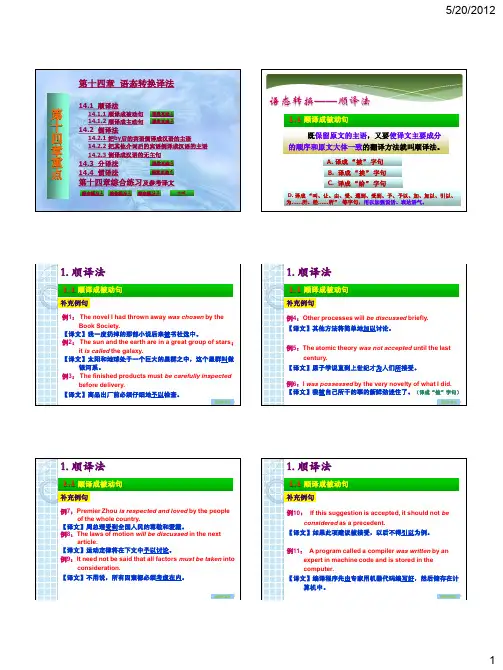
(完整版)翻译技巧翻译方法_文档视界翻译技巧和翻译方法翻译方法:methods of translation1.直译literal translation2.意译free translation3.异化alienation4.归化domestication1. 直译(literal translation)指在翻译过程中按原文逐字逐句一对一的翻译。
人们关心的是语言层面的技术处理问题,即如何在保持原语形式的同时,不让其意义失真。
e.g.one country, two systems 一国两制The three religions and the nine schools of thought 三教九流2. 意译(free translation;paraphrase)是指根据原文的大意来翻译,不作逐字逐句的翻译(区别于“直译”)。
通常在翻译句子或词组(或更大的意群)时使用较多,意译主要在原语与译语体现巨大文化差异的情况下得以应用.从跨文化语言交际和文化交流的角度来看,意译强调的是译语文化体系和原语文化体系的相对独立性。
e.g.Don’t cross the bridge till you get to it.不必过早地担心。
(不必自寻烦恼)Do you see any green in my eye?你以为我是好欺骗的吗?Don’t lock the stable door after the horse has been stolen.直译:不要等马被盗后,才去锁马厩门。
意译:亡羊补牢。
直译和意译的区别1. It’ s a Smoke Free Area.直译:它是个自由吸烟区。
意译:它是个无烟区。
2. Shakespeare put his hometown on the map.直译:莎士比亚把他的家乡放在了地图上。
意译:莎土比亚使他的家乡声名远扬。
3. John would not come out of his shell and talk to others at theparty.直译:晚会上,约翰不愿从壳里钻出来与其他人说话。
翻译技巧中的换形译法举例换形译法是翻译中常用的一种技巧,也称为意译。
它指的是将原文中某个形式的表达方式转化为另一种形式,以便更好地传达原文的意思和情感。
下面是几个换形译法的例子:1. 转换句式:原文中的长句可以根据目标语的语法习惯和表达方式进行分割和简化。
例如,原文中的一条长句子“Despite the fact that he was tired, he managed to finish the project on time”可以换形为“虽然他很累,但他仍然在规定时间内完成了这个项目”。
2. 转换主动语态为被动语态:原文中的主动语态可以改为被动语态,以便更好地传达原文中的重点和情感。
例如,原文中的句子“I made a mistake”可以换形为“我犯了一个错误”。
3. 转换动词词性:原文中的动词可以根据目标语的习惯转换为名词、形容词或副词等。
例如,原文中的句子“He walked quickly”可以换形为“他迅速地走了起来”。
4. 转换固定搭配:原文中的固定搭配可以根据目标语的习惯进行重新组合或替换。
例如,原文中的句子“He has a heart of gold”可以换形为“他心地善良”。
5. 转换文化背景:原文中的某些文化和背景知识可能在目标语中没有对应的表达方式,因此可以使用相似或相关的文化元素进行替代。
例如,原文中的句子“His face turned as red as a tomato”可以换形为“他的脸变得通红”。
6. 转换成语和习语:原文中的成语和习语可以根据目标语的习惯进行替换或解释。
例如,原文中的句子“He’s just a wolf in sheep’s clothing”可以换形为“他就是个披着羊皮的狼”。
7. 转换修辞手法:原文中的修辞手法可以根据目标语的修辞习惯进行重新表达。
例如,原文中的句子“All the world’s a stage”可以换形为“整个世界就是一个舞台”。
语态转换译法
语态转换译法是一种英汉双语翻译的译法,它可以有效地增强译文的对比性,并使母语和外语之间的关系变得更加清晰明了。
语态转换译法是译文写作中最常用的方法之一,其目的是以母语概念和英语概念之间的一致性来增强译文中母语和外语之间的联系。
语态转换译法具有一定的表达能力和有效性,它不仅可以阐明译文的概念,还可以提高母语和外语在译文中的表达能力和精确性。
语态转换译法的基本原理是在译文中保留母语和外语之间的系统性关系,即保留原文中的句法结构,把原文的句式结构转换成英语的句式结构。
在使用语态转换法时,译者需要把母语的某种句子结构转换成一种英语句子结构。
语态转换译法有助于保持原有的句子结构,以使译文更加通顺、流畅、熟悉。
语态转换译法是英汉双语翻译中最重要的译法之一,它以特定的语态结构进行英汉双语翻译,使译文与原文保持一致,能够更加准确地表达母语的概念。
它也被广泛用于科技性文章的翻译,使得译文更加可靠,更能满足读者的要求。
语态转换法在翻译中的应用有很多方面,在使用时应当注意以下几个原则:1.在相同的句子结构中应尽量保持原语语态结构。
2.尽量确保译文中出现的母语和外语之间的相互联系。
3.在译文中尽量表达原文的概念,确保译文的可理解性和准确性。
4.尽量在译文中保持原有的表达方式,使译文具有良好的句式结构,从而获得良好的口语效果。
语态转换译法是英汉双语翻译的重要方法,它可以有效地解决翻译中的语义上的问题,也可以有效地保持原有的句子结构,从而使译文更加准确,更具有口语效果。
语态转换译法的运用不仅可以增强译文的准确性,还可以提高译文的可靠性和可理解性,为英汉双语翻译提供了有效的帮助。
翻译中时态和语态的转换“转换”在翻译中是用的很广泛的一个概念,一种基本技法。
译词有转换,译句也有转换。
语态的转换1、汉语主动态→英语被动态(箭头表示转换)英语中被动态使用范围很广。
凡是在不必说出主动者,不愿说出主动者,无从说出主动者或是为了行文上的方便,使上下文更连贯等等场合,往往都用被动语态。
汉语与英语不同。
汉语的被动式用的较少,这也是汉语的特征之一。
严格说来,汉语动词不具备以形态作依据的“被动范畴”。
汉语动词不具备英语动词那样的形态变化,而主要依靠词汇手段以及句式来表示被动。
就翻译而言,有显性被动特征的句子在英译汉时是比较好处理的。
但在很多情况下,汉语诸位之间的被动关系是隐含的,不一定非要借助“被”、“叫”、“给”、“受”、“遭”、“让”等助词来体现,也可以说汉语的被动在内容后和形式上并没有形成严谨的规范,以汉语做母语的人主要靠交流中的语感来表示主动与被动。
(1)、日本两位围棋高手接连受挫。
Two super go players from Japan were defeated one after another.(2)、错误不应当加以掩饰,而必须加以揭露,才能得到改正。
Mistakes must not be covered up. They must be exposed before you can correct them.(3)、这种行为将为所有有良知的人所蔑视。
Such conduct will be looked down upon by all with sense with decency解释:以上三例都有明显的被动标志:“受”、“加以”、“为……所”,这类汉语句子叫做显性被动语句,汉译英时可译成对应的英语被动态。
值得注意的是,汉语中这些显性被动标志在翻译是不一定要用英语动词的被动式,要具体情况具体对待,也可以用含有被动意义的名词、分词、形容词或介词短语来表达。
如下二例:(1)、他本想再去天津,遗憾的是被病魔夺去了生命,没能看到经济建设给他的故乡带来的翻天覆地的变化。